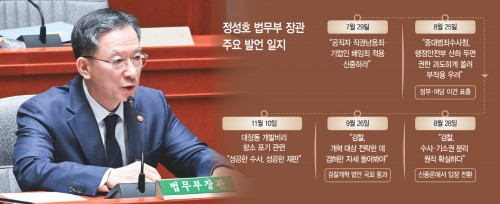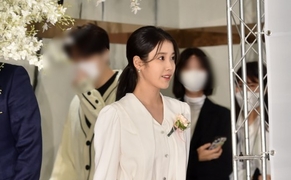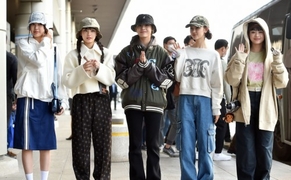 |
Critics say Justice Minister Chung Sung-ho has acted more like a spokesperson for the presidential office in Yongsan and the ruling party than as the guardian of independent legal administration. As major issues such as prosecution reform unfolded, observers noted that he often aligned with the preferences of the presidential office and ruling bloc, diminishing his own policymaking authority.
Chung is now facing allegations of exerting improper influence in the process that led prosecutors to drop their appeal in the Daejang-dong development corruption case. Acting Prosecutor General Noh Man-seok (Judicial Research and Training Institute Class of 29), who also serves as deputy prosecutor general, reportedly told senior prosecutors on Nov. 10 that “the vice justice minister presented the option to forgo the appeal,” triggering a widening dispute over political pressure.
Appearing before the National Assembly’s Special Committee on Budget and Accounts on Nov. 12, Chung denied issuing any direction regarding prosecutorial decisions. When Rep. Bae Joon-young of the People Power Party asked whether he had instructed the vice minister to tell the acting prosecutor general that he was free to drop the appeal, Chung replied, “That never happened.” The vice minister acknowledged speaking with Noh by phone but also denied exerting pressure.
Legal experts note that, given President Lee Jae-myung’s connection to the case, the justice minister’s involvement is bound to raise questions.
On Oct. 31, the Seoul Central District Court’s Criminal Division 22 sentenced five private-sector figures involved in the Daejang-dong scandal to heavy prison terms but did not rule on whether President Lee had colluded with them. While the court found that former Seongnam Development Corporation planning director Yoo Dong-gyu acted as an intermediary rather than a key decision-maker, it did not specify the role of the “Seongnam City leadership.”
A central issue is that although the court accepted many of the prosecution’s arguments, it still delivered some not-guilty verdicts. The court acquitted Kim Man-bae, major shareholder of Hwacheon Daeyu Asset Management, of bribery charges tied to alleged promises of profit-sharing with Yoo — a point prosecutors argue required further legal review at the appeals level.
The court also ruled that calculating the precise damage inflicted on Seongnam City was difficult, ordering the forfeiture of only 47.3 billion won out of the 489.5 billion won the prosecution estimated. By dropping the appeal, prosecutors have now lost the opportunity to challenge this in the higher court.
If the government’s push to abolish the crime of breach of trust becomes reality, the convictions for corporate breach of trust in this case could be overturned or dismissed. With prosecutors opting not to appeal, the appeals court cannot reverse acquittals issued by the first trial court.
The appeals outcome will inevitably influence President Lee’s separate trial, in which he was charged with designing a profit structure favorable to private developers during his tenure as mayor of Seongnam from 2010 to 2018, allegedly causing 489.5 billion won in damages to Seongnam Development Corporation. The Seoul Central District Court has placed that trial on indefinite hold due to presidential immunity.
With the core questions about President Lee’s involvement unresolved — and the Daejang-dong appeal now abandoned — voices in the legal community argue that Minister Chung has consistently acted in alignment with the presidential office and ruling party, particularly in matters tied to prosecution reform.
A former high prosecutor commented, “Given the scale of public interest, the case should have been reviewed all the way to the Supreme Court to fully resolve the suspicions. Citing ‘mechanical appeals’ as a reason to drop the case can only be seen as a move to ease the president’s legal risks. This is effectively political leadership attempting to politicize the justice system.”
Most Read
-
1
-
2
-
3
-
4
-
5
-
6
-
7





















